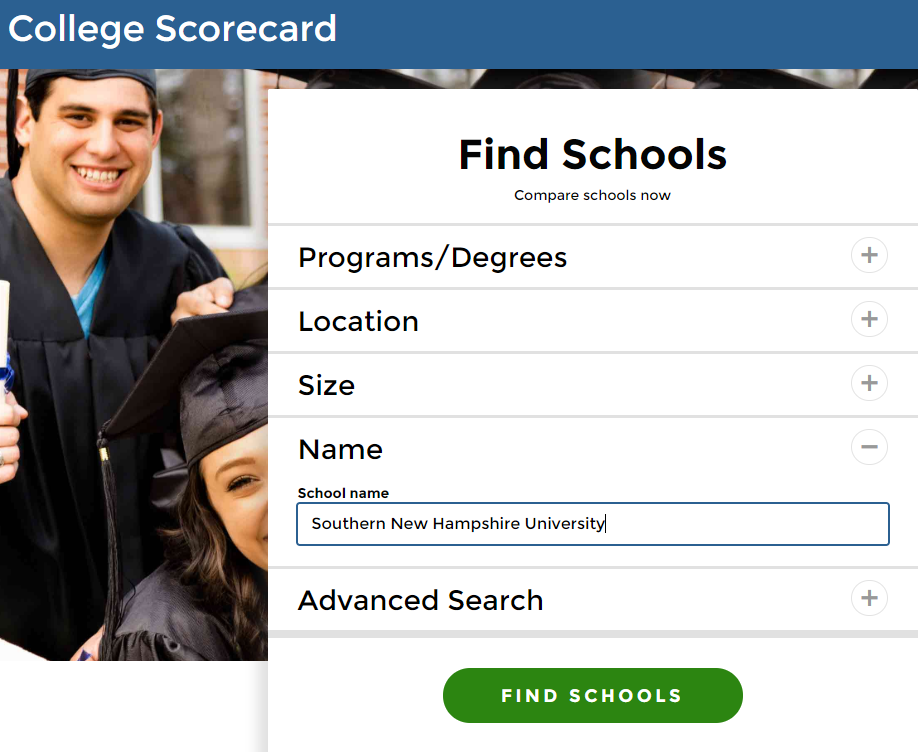Are Online Colleges Legit? How to Avoid Scams and Find Reputable Online Schools
If you’re questioning whether online colleges are legit, we’re here to say that yes, there are many solid online college options that are worth your money. However, that doesn’t mean that there aren’t some less-than-savory institutions out there that you should avoid. Here, we’re going to show you how to separate the reputable schools from the fly-by-night diploma factories.
Many brick-and-mortar schools offer online degree options, and you can often expect those programs to reflect the reputation and reliability of the school as a whole. But when you're considering online-only colleges, it may be harder to evaluate the institution.
Get Free Information For Your Degree
Let's look at the things you should evaluate when considering online-only colleges, including:
- Accreditation - We'll talk about why it matters and how to check it.
- Student reviews - We'll show where to find them and what to look for.
- School stats - We'll fill you in on the three metrics you need to know and where to find them.
Reputable online colleges will be accredited
If you enroll at a school that’s not accredited, your degree won’t be worth the paper it’s printed on. Accreditation shows that a school meets the educational standards set and enforced by a review board of university-level educators and administrators.
Accreditation is handled by different regional agencies based on a school’s location. For online-only schools, the accreditation agency is generally determined by where the school’s headquarters are based. Schools with many locations may have accreditation from several different accrediting commissions in various geographic regions.
Online schools are subject to the same accreditation requirements as brick-and-mortar schools.
See also: Are There Online College Grants for Adults?
How to check online college accreditation
Checking a school’s accreditation is faster and easier than you might think. The U.S. Department of Education maintains a Database of Accredited Post-Secondary Institutions and Programs.
Just type in the name of the school you’d like to check.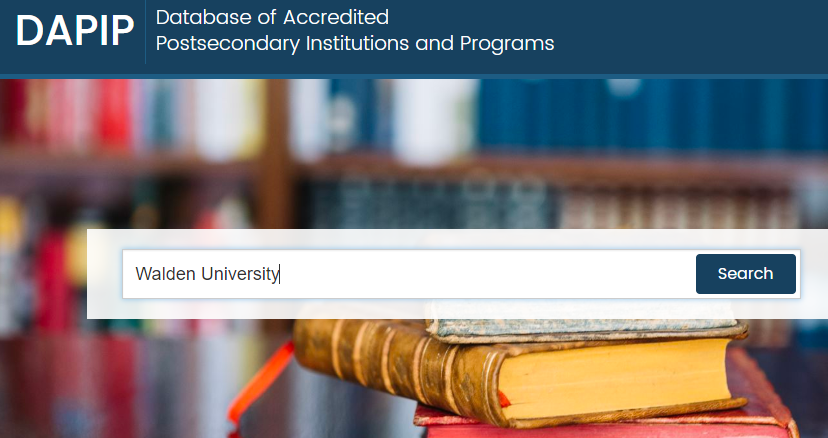
Click on the school name to view accreditation. 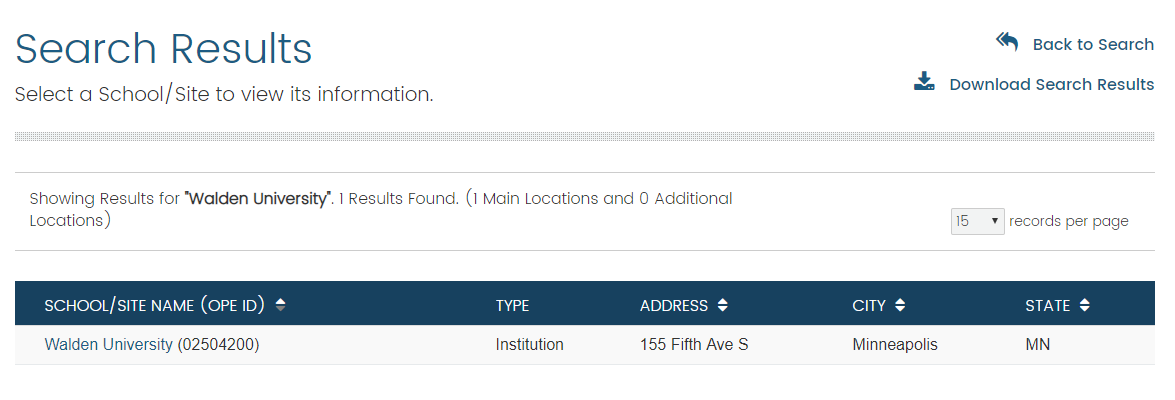
Here, we can see that Walden University was accredited by the Higher Learning Commission and will need to be re-accredited by 2022.
Clicking on the accrediting institution’s name will show us a little more about the evaluating body.
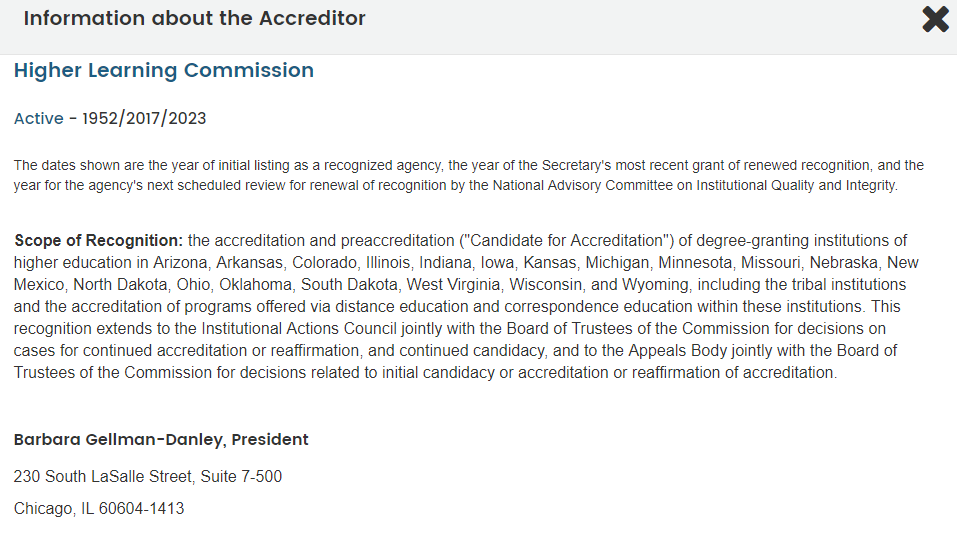
Seems legit, right? Walden University is an accredited university.
See also: Online Colleges That Accept FAFSA.
What if an online college is not accredited?
How will a school look if it’s not accredited?
Education Corporation of America, a company that ran a chain of for-profit “career focused” schools, recently lost its accreditation and closed its campuses. Some of the colleges under the ECA umbrella were Brightwood College, Brightwood Career Institute, Ecotech Institute, Golf Academy of America and Virginia College. Let's see how they show up in the accreditation database.
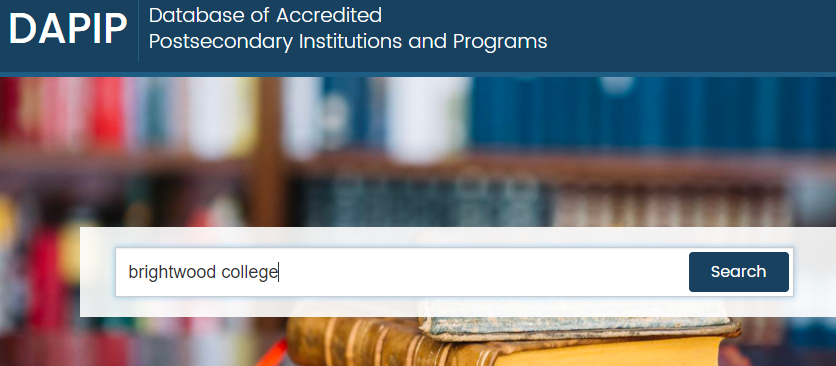
This school had a lot of campuses, which isn’t unusual for for-profit schools.
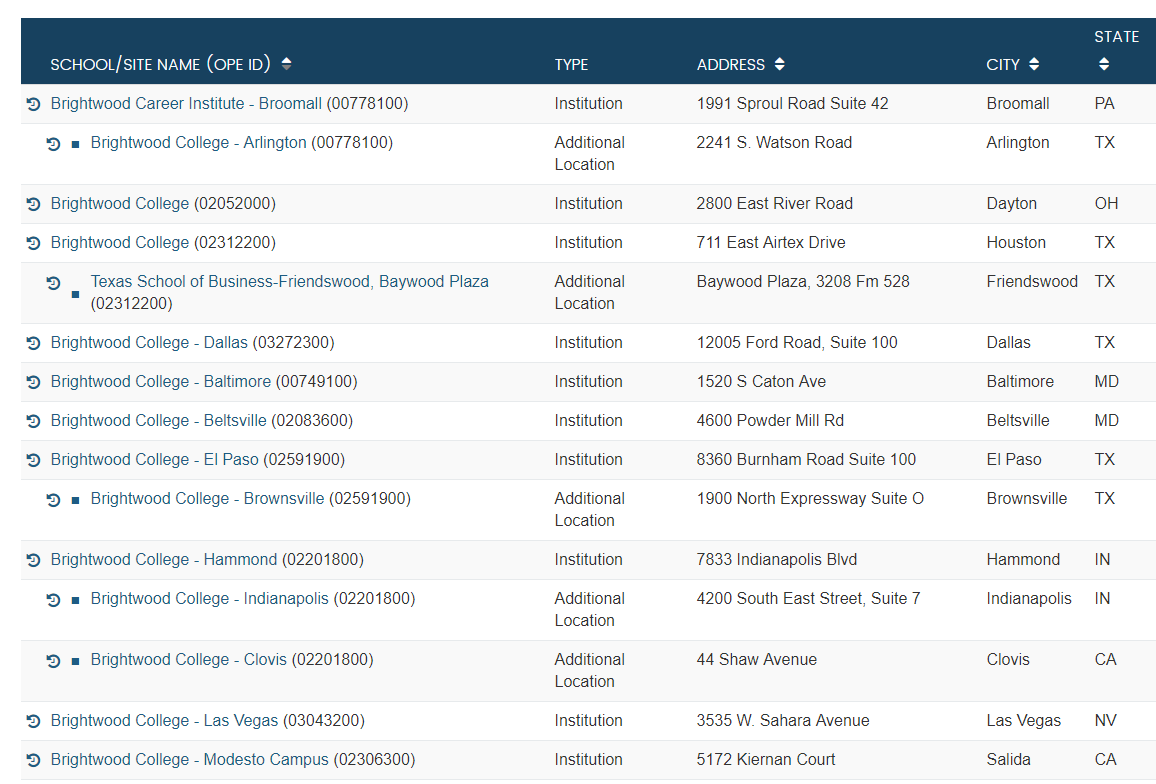
Let’s see what happens when we click on the Dayton campus.
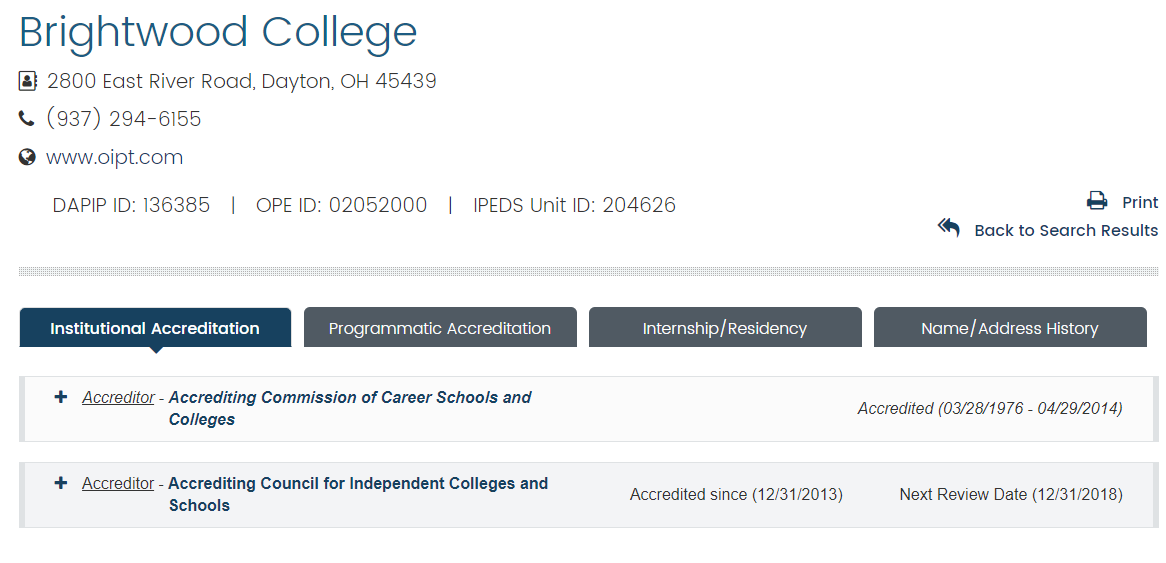
Note that the listing doesn’t say the institution isn’t accredited, it just lists one outdated accreditation and one “next review date” that has already passed.
Your takeaway: If you’re unable to find a school in the database, or if the accreditation does not appear to be current, find another school.
If you’re already in the admissions process with a school that doesn’t have a current accreditation, be wary of promises that they expect to have it soon or that it's in-process. Either select another school (which should’ve be too hard with the amount of online offerings currently available) or wait until the next term to ensure that the accreditation has been solidified.
Caution: If you pay money to a school without accreditation, there’s no guarantee that you’ll get your money back. And if you do get it back, it’s likely going to take a long time. Save yourself the hassle by being a smart shopper right out of the gate.
Always check reviews for online colleges
Even if a school has a legit-looking web site and their accreditation is in order, it’s still smart to dig deeper into the student experience before you invest your time and money in a particular course of study.
Reviews are easy to find. Just type your school name followed by the word “review” into your preferred search engine. 
There are multiple websites that exist solely for the purpose of allowing students to share their views on their college experience.
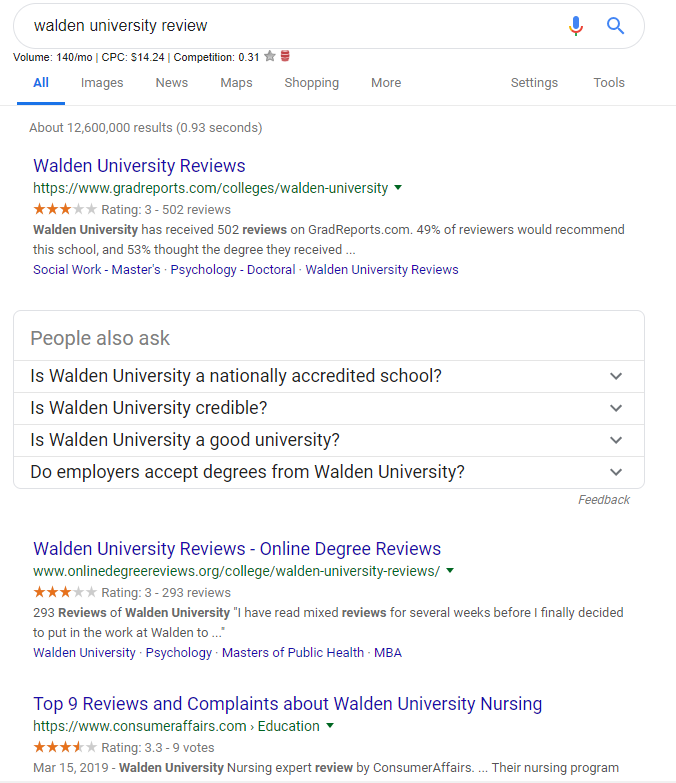
To get an even better sense of what to expect, add in the name of your major.
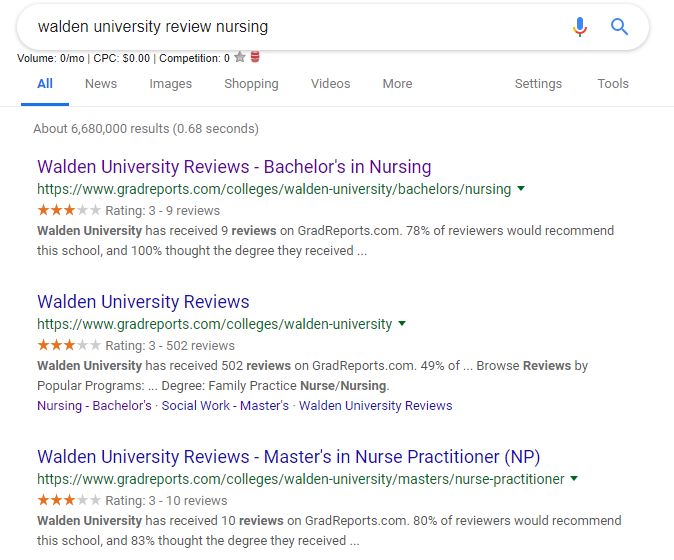
With any online review, remember that people are generally more likely to leave reviews after having a negative experience, so be sure to take complaints with a grain of salt. Also, remember that with any college program, you’ll only get out of it what you put into it.
However, if you see repeated complaints about the same issue, remember to take that into account when making your school decision.
Check the school’s average cost, graduation rate, and average salary after graduation
If you start at a school, you’d probably like to know your odds of being able to finish the program there and obtain your degree.
That’s not hard to find out thanks, once again, to a handy database by the Department of Education. The College Scorecard can help you gauge how successful a school’s graduates are based on actual numbers, rather than slick marketing campaigns.
Type in the school you’re interested in.
For Southern New Hampshire University (SNHU), here's what comes up.
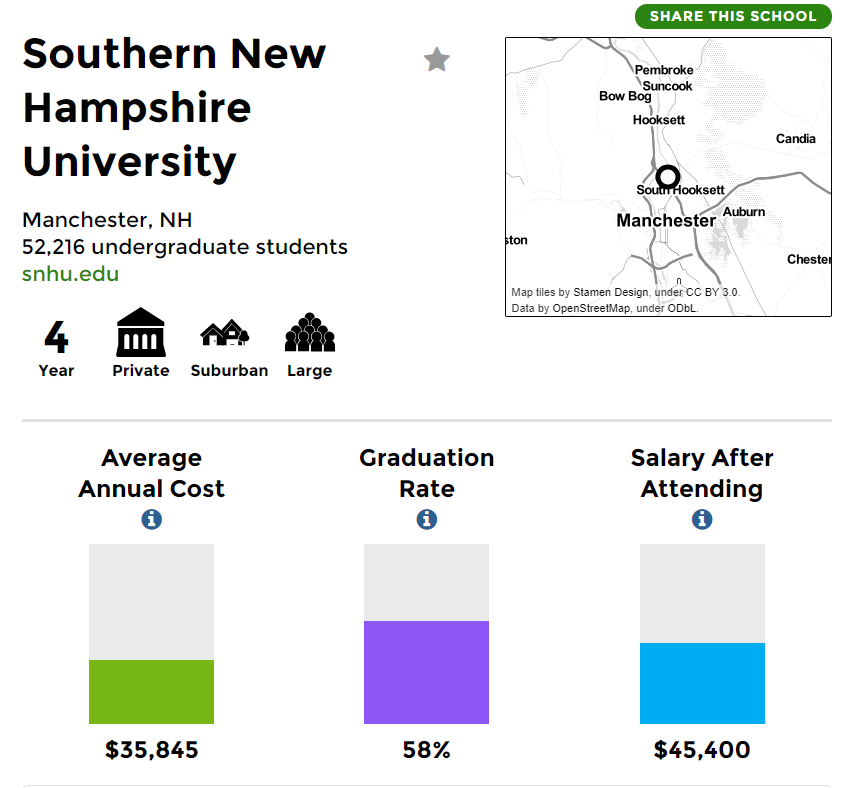
Let’s dig deeper into these numbers so we know what we’re dealing with. If we click on the “i” on any of the charts, we can get more information.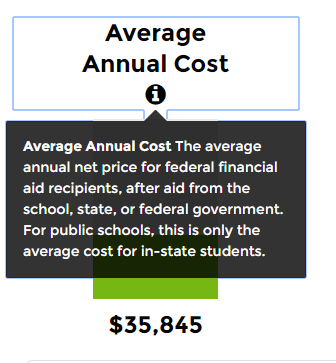
SNHU costs close to $36,000 per year.
Keep in mind that this school has a massive online degree program, with about 90,000 students. It also has a physical campus, with about 3,000 students enrolled. So here, it’s important to remember that a small portion of students may live on-campus and drive up the average cost—but probably not all that much, since the online students outnumber the on-campus students by a lot.
Note that the number above is the net price, AFTER financial aid.
Tip: If you’re considering a school that has a physical campus and online programs, be sure to find out what the actual cost of attendance is for the online program, including tuition, books, fees, lab charges, etc., compared to the on-campus cost.
Since SNHU is not a public, or state, school, the in-state designation doesn’t matter, but it does bring up an important reminder. That is, you may find significantly reduced tuition at a state school in your home state, even if you plan to go online. You can reduce those costs even further by attending a community (in-person or online) during the first half of your studies.
See also: What is the Cheapest Way to Get a Bachelor's Degree?
Now let’s look at graduation rate.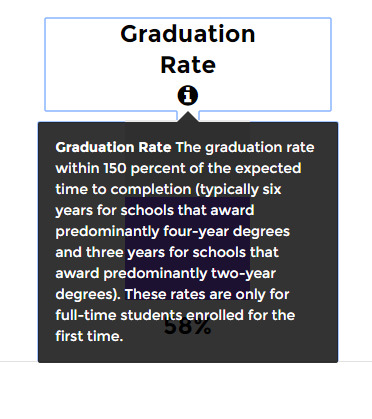
Consider that the average college graduation rate for institutions of all kinds (private, public, online, traditional) is 60%.
SNHU is close to average at 58%. Not bad. However, remember that these rates are for full-time students only. Most online students only go part-time.
Tip: The graduation rate is still a useful metric even if you're not full-time, in that it can give you an idea of how the institution operates in general. If you’re only going part-time, talk to an admissions counselor about the graduation rate for students with a similar profile.
Let’s look at the last number now.
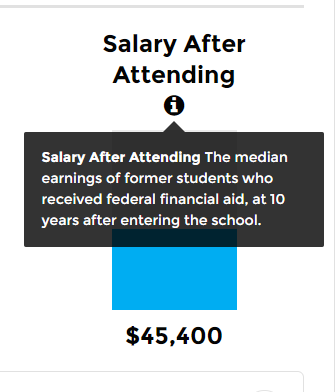
This is probably the most-important number on the page. This is the number you’re potentially going to be seeing on tax returns in years to come.
As the “i” pull-down shows us, this is the amount the average grad is making ten years after starting at the school. So if you’re starting college in 2019, this is what you can expect to be bringing in by 2029, depending on your course of study and geographic area.
Consider this number in light of the average annual cost of the school, which is close to $36,000 per year after financial aid—about $144,000 over four years for a full-time student.
Tip: Comparison shopping is critical when you're thinking about making a five- or six-figure investment. Always carefully consider the ratio of money-out vs. money-in when selecting a school and a major. Our NitroScore tool can help you get an apples-to-apples comparison of your future financial outlook based on different schools, majors, and student loan amounts.
What’s the right school for you?
When selecting an online college option, remember to check the school’s accreditation, its online reviews, and it’s graduation rate and costs.
Then, carefully consider how the school’s program will gel with your life. If you’re planning to work while going to school, think about whether the program’s structure will work with your schedule. For example, if you have to be online for a class every Wednesday at 8 PM, but you have an unpredictable schedule, you may want to find a school with a more self-directed program.
You will also definitely want to carefully investigate the financial aspects of attending your school of choice. With so many reputable online degree options available, including quite a few from traditional brick-and-mortar schools, it’s definitely wise to take the time to shop around a bit and find the program that fits best with your life and your budget.
To learn more, check out our recent roundup of the 20 Most-Affordable Online Bachelor Degree Programs.
